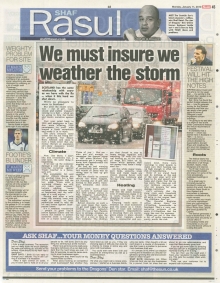Scotland has the same relationship with snow as we have with the flu – when it hits hard we shut down.
We’re no strangers to snow in Scotland.
But after the recent situation – out of grit, roads closed and public transport coming to a halt – when are we going to bite the bullet and insure ourselves against it?
Cast your mind back to 2008 and employers in London were offering £200 sweeteners to staff who braved a freak snowstorm and made it in to work.
The city’s councils came under fire for not being better prepared, but Mayor Boris Johnson said snow is such a freak event that any money thrown at expensive anti-snow measures would be a bad investment.
Now, like Boris, I don’t like bad investments but, a year later, the same thing is happening.
If we size up the economic damage a cold snap can do, insuring ourselves against ‘freak’ weather is a necessary evil.
The arguments for and against climate change are for another time, but a Met Office spokesperson told me last week, “Even with a warming climate we will still have cold winters,” before adding, “some extremes will increase such as heatwaves and the coldness of a cold winter.”
During and after a cold snap, the country loses vast sums of money, so local authorities need to take the hit and insure against unexpected losses.
It’s a common transaction – people in great health insure against illness and we insure our homes to protect ourselves from a burglary, fire or a burst water pipe.
Those of you – like me – who are old enough to remember the famous storm in 1987 when Michael Fish notoriously got it wrong will know how unpredictable the weather can be.
We had no real warning of particularly poor weather this winter so there was no strong case to beef up grit supplies.
But we should be covered should the worst happen, not running out of grit and having to halt public transport networks and close roads.
Last week, every school and nursery in Lothian was shut with similar stories in Fife, Glasgow, Lanarkshire, Highlands, Central, Aberdeenshire, the Borders and the Islands.
School closures on such a vast scale mean that teachers get paid wages for doing nothing – that’s nobody’s fault, it’s just a fact.
Parents have to arrange childcare at the last minute or take the day off at a cost to them or their company.
The children are then forced to stay at home eating supplies and watching TV with the central heating on, so the council wage bill leaks on all fronts while parents shell out money they hadn’t budgeted for.
All this while major transport links, airports, train lines and trunk roads are closed, playing havoc with the morning commute and hitting businesses in the pocket.
Shops and high streets will feel the pinch because, even if employees make it in to work, there’ll be little shopping to cover the heating bills.
Keeping roads open is essential for local economies and the nation as a whole. Part of local and national government’s responsibility is ensuring there are contingency plans in place should the worst happen.
Aside from a commercial and economic level, there were warnings to older people to make sure their heating was up high enough to offset the risk of hypothermia.
Even if we stand back and do nothing, at the end of the cold snap we’ll still have to fix and smooth potholes and cracks that the ice has worn.
The clean-up will cost millions anyway, so why not prepare for some damage limitation?
Let’s estimate that the snow costs each household in Scotland an average of £5 extra in lost wages, heating, childcare, food etc.
The General Register office shows there are 2.27million households in Scotland. That’s a very conservative estimate of an extra £11.35million that the snow has cost the economy.
When you put it like that, a bit of extra insurance is surely worth the risk.
| Related Content Video: How To Build A Business Empire |

